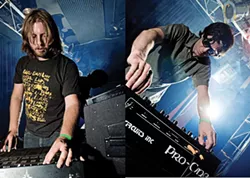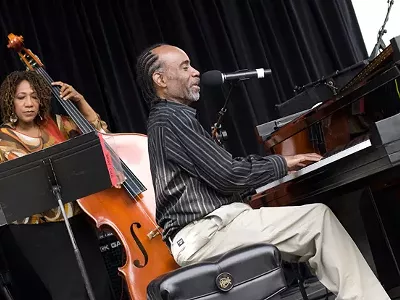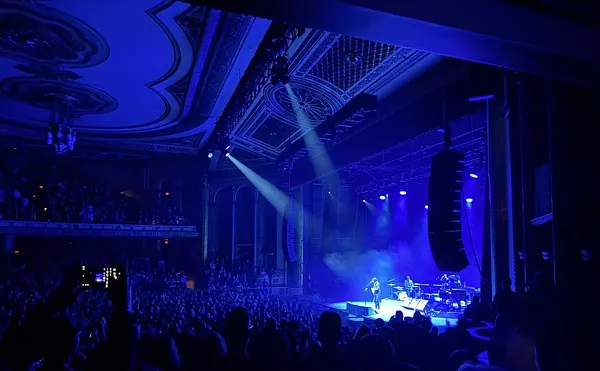
Audio By Carbonatix
[
{
"name": "GPT - Leaderboard - Inline - Content",
"component": "35519556",
"insertPoint": "5th",
"startingPoint": "3",
"requiredCountToDisplay": "3",
"maxInsertions": 100,
"adList": [
{
"adPreset": "LeaderboardInline"
}
]
}
]

If you've not heard Detroit duo Moon Pool & Dead Band, you've likely heard something one of them has created. See, Moon Pool & Dead Band is Nate Young — a linchpin in Detroit and Ann Arbor's noise scene and a driver behind its brutally awesome flagship band, Wolf Eyes — and Dave Shettler, drummer, percussionist and sonic renaissance dude perhaps best known for his contributions to the Sights and as one-third of SSM. Young and Shettler formed MP&DB a little more than a year ago, and they create some of the most adventurous, groovy noise to escape the city in years; a combination of Young's oft-abrasive, chaotic din and Shettler's pop, polish and rhythm methods. The duo has released one cassette and a number of compositions via the Internet (found on their Facebook page). The band name is a joining of Shettler and Young's noms de plume for this project.
"My contribution is like a Moon Pool, an Abraham Merritt reference, explains Shettler, "and Nate's is like a Dead Band, a chaotic frequency modulation." Here Shettler talks of their upcoming show at Southwest Detroit's new music venue the Bakery where they'll alternate sets with heavy-rock outfit Quail.
Metro Times: How did you and Nate come to collaborate? Had you known of each others' work for a while?
Dave Shettler: I'm not sure if Young had a familiarity with what I'd been doing at all, but I'd seen Wolf Eyes. I was offhandedly interested because it reminded me of academic music, like Stockhausen or something. Huge fan of Demons. I think we really connected through mutual friends in Switzerland who were familiar with both of our stuff, and had had us both over there to play on separate occasions. Through that we realized we had mutual friends in Detroit and actually lived blocks away from each other. We began by just experimenting with tape machines and synthesizers over beers for no other reason than my wanting to pick Nate's brain about tape and feedback.
MT: What is the driving aesthetic or sonic idea behind Moon Pool & Dead Band?
Shettler: I think it began to take shape with just really wanting to master our equipment. Really knowing how these machines work and knowing what sort of sound they will make if we turn this knob or flip this switch. After that just giving respect to the masters of electronic music. Acedemic, Dance ... Haack, Derbyshire, Moroder, Soccio, Atkins, May. The list of influences is endless. It's a hard sell, though, because it's not techno, it's not house, it's not disco, it's not kraut, it's not noise ... what is it? It's a common ground between all of these things. You definitely won't think we're checking our e-mail on stage though. No laptops.
MT: You are known as a drummer-percussionist (generally, I suppose), but here it's a more broad, sonic wide-open palette you're working with. What drives your musical expression? That is, does it generally come back to rhythm, etc.?
Shettler: I've always looked at the drums, especially when recording or creating, as just one part of a greater whole. I've always tried to force other melodic and textural ideas on people I've backed up over the years via vocals, synthesizer, other keyboards, and I think it's showed. I had Little Steven tell me that I single handedly ruined the Sights, his favorite band, not for the drumming, but for all the other psychedelic stuff I did on the second record. To me, the music just called for all that and that really empowers me.
This project has just been more of me taking a more active role in getting things rolling. I've been backing people up and helping to produce their music for 10 years, now I'm just producing my own ideas.
MT: What does Moon Pool bring out in both of you that your other bands and outlets don't?
Shettler: I haven't been worried about something not being appropriate to someone else's vision. I don't have to worry about someone saying, "Is this still rock music anymore?" Or, "No, no, no: That sounds like a video game" I would want to say, "Yes, it does! That's why it's so great!" No worries of anyone saying "No, this doesn't even sound like music" That's OK. It's still art. We haven't starting playing sports or hunting deer or something. We're making art.
Nate and I are both hypercritical of each other, but there is a relaxation that is going on. We trust each other. There aren't really any preconceived ideas of what it's supposed to sound like. I think that's when things get stale. People have to realize with a collaboration — it might not turn out exactly like you hear it in your head, but it's not a compromise, it's just making things more interesting ... hopefully.
As far as Nate goes, you'd have to ask him, but I think it would have to do with melody being such a prevalent element. I don't think he ever had to worry about tuning as much as he does with this group.
MT: Can you tell me a bit about the Bakery Loft — its origins as a space, the idea and people behind it, your involvement?
Shettler: It's the loft above the Mexican Town Bakery on Vernor across from Clark Park. It's a beautiful space. Jay Rowe from Quail basically hooked us up with Jessica and Adam who run it. I like that it's close to home and something different.
MT: It seems like southwest Detroit is getting a bit of experimental music culture momentum with bands like you guys, Bad Party, Alivia Zivich, Jessica Hernandez, Kroha and others operating from there. What do you like and value about the area as a place to live and work?
Shettler: What can I say that hasn't been said by the New York Times or Patti Smith or whatever. ... Detroit has an air about it that no other city really captures. I've been living in the city proper for more than 10 years. People are enthusiastic about art, music, culture. People aren't worried about perfect lawns or making too much money or whatever it is that these sort of greedy square people worry about. You don't get too many dish rags in Detroit because there isn't really any money to be made off of anyone. People just want to do their thing, have people around them that might appreciate it, and have the opportunity to appreciate others, doing the sort of things that are interesting and new.
As far as southwest, I like it because there are a lot of people around, it's fairly diverse and heavily populated. I can walk for groceries, batteries, blank cassettes.
MT: Has Moon Pool found an audience? How are people reacting to it?
Shettler: We've had a great response on the net. People claim to love it. We even had a fan in England send us a vintage synthesizer to use. Just ended up at Nate's door one day. "Here, love the sound, you blokes need this."
MT: How has the ability to release music "as it happens" changed your approach to making the music?
Shettler: I think it's similar to a cassette culture in a way, only on a broader scale. Anyone with a computer can listen to our "demos," I'd guess you'd call them. But they're out there, available to everyone. I think we just lucked out with jams that we want to share with people. Sometimes we'll just lay something down and throw it up on the net five minutes later. I respect when people can hold back like Conspiracy of Owls, Infinity People and not let anyone hear something till it's perfect, but I think this project is more malleable at all times. We're not striving for perfection; we strive for variety and making it interesting and different every time.
The recordings so far are really just basic blueprints. The magic is in the live performances. Eventually we'll go into a professional studio with a multi-track tape recorder and professional gear and record definitive versions of these tracks. I still believe in the importance of that.
MT: Do you have plans to unleash any more "tangible" documents soon?
Shettler: As soon as it makes sense. I still feel like we're evolving at an alarming rate. As soon as we both feel like we have a monster first LP we'll cut one. There are some vinyl singles in the works for early next year though.
MT: The show at the Bakery Loft has you and Quail trading sets over the night. Any particular hope for what develops from that dynamic? Is it a rock-off or a duel?
Shettler: That was Jay's idea; he wanted to have a concept of nonstop music. I was into it because we always feel like we're just getting warmed up after an hour of playing. I've had more than a few people say that we should play longer, and we've never done a set shorter than 55 minutes and that was on a support slot. I've had experiences playing in Europe where people will get upset if you don't play for one and a half, two hours. It's not punk, it's not noise, it's not abrasive and I think people could deal with two-hour sets, enjoy them even. DJ's will play for hours on end! And that's great because people just lose themselves in the rhythm, in the texture. I don't get up there so people will look at me or what I'm doing, I do it so people can lose themselves in the sound and just enjoy themselves getting out of their heads, high — on drugs, on life, on Jesus, on the vibration, on the color. That's what I'm doing. I think everything in the universe consists of vibration and these sounds we are making are super-concentrated vibration, the kind you can hear and that really affects your body, your mind and your soul. The soul is vibration.
Friday, Oct. 15, at the Bakery (the loft above the bakery at 4303 Vernor Hwy., Detroit); $5 admission, first set at 9 p.m.; for more info and music, go to facebook.com/moonpooldeadband.





